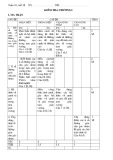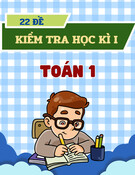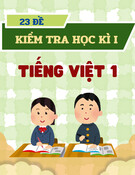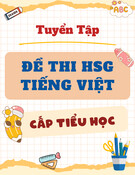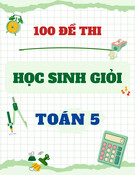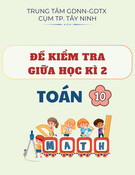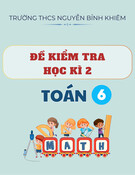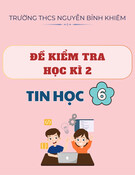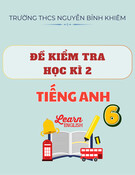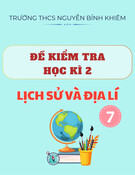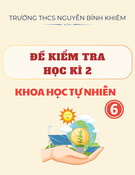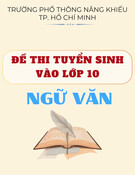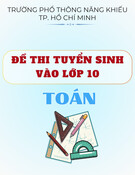TRƯỜNG THPT NGÔ GIA TỰ TỔ: NGOẠI NGỮ ĐỀ KIỂM TRA 1 TIẾT (Lần I) Môn: Tiếng Anh 10
Họ và tên học sinh: ........................................................................................... Học lớp: .............................. SỐ BÁO DANH: ............................................. Mã đề: 005
Mark the letter A, B, C, or D on your answer sheet to indicate the correct answer to each of the following questions from 1 to 14 Câu 1: I'll see him when he ………….here tomorrow. A. will come B. had come C. comes D. has come
Câu 2: By the time I …………you I ………………in that company for five years. C. met/ have worked B. met/ had worked A. met/ was working D. had met/ worked Câu 3: ………… is the study of gases, liquids and solids to understand how they are made and what they do. A. Biology B. Physics C. Chemistry D. Mathematics Câu 4: We ……….. him since he ……….. married. A. don’t/get B. didn’t see/got C. haven’t seen/got D. hadn’t seen/got Câu 5: He’s not really interested in ………….. on the farm. A. work B. working C. worked D. to work Câu 6: M i s s Phuong went home early.
A. Why went home early ? C. When went home early ? B. Who went home early ? D. What went home early ? Câu 7: By the age of 35, my uncle …………..his own business. A. had started B. would start C. has started D. started Câu 8: During my break, I often drink tea with my fellow ………… and smoke local tobacco. A. men D. person
C. peasants B. people Câu 9: Most people enjoy …………….. to different parts of the world. C. to travel B. travelled A. travel D. travelling Câu 10: It’s rude to …….. people when they are speaking. A. interrupt B. interfere C. introduce D. prevent Câu 11: Human beings must stop ………….the environment. A. polluted B. to polluted C. to pollute D. polluting Câu 12: The World War II …………in 1939 and ……..in 1945. A. had begun/ ended B. begins/ ends D. has begun/ had ended C. began/ ended Câu 13: I always get up early to ………… spme water for my morning tea. A. pump B. bring D. boil
C. cook Câu 14: She won't get married until she ………….. 25 years old. C. was. B. is A. had been D. will be
A. hit A. read A. beer A. repeat C. sit C. heat C. leek C. eaten B. sink B. tease B. seen B. beat D. shine D. heart D. sheet D. head
Mark the letter A, B, C, or D on your answer sheet to indicate the word whose underlined part differs from the other three in pronunciation in each of the following questions from 15 to 18 Câu 15: Câu 16: Câu 17: Câu 18: Mark the letter A, B, C, or D on your answer sheet to indicate the most suitable response to complete each of the following exchanges from 19 to 20 Câu 19: Who are you? - ……………………………………. A. How do you do? B. My name’s Ted Owen C. Thank you, Ted Owen. D. Fine, thank Câu 20: Where do you work? - …………………………..
A. I like my job as a book seller C. I’m a book seller B. I have a job in a book shop. D. I sell picturebooks.
Mark the letter A, B, C, or D on your answer sheet to indicate the word(s) CLOSEST in meaning to the underlined word(s) in each of the following questions from 21 to 22 Câu 21: The alarm goes off at 4:30. A. stops working B. rings C. goes on D. goes wrong Câu 22: My teacher loves her teaching profession because she loves working with children. A. career B. teacher C. worker D. professor
Mark the letter A, B, C, or D on your answer sheet to indicate the sentence that is closest in meaning to each of the following questions from 23 to 26 Câu 23: We moved to the city ten years ago. A. How long did you move to the city? C. When did you move to the city? B. Where did you move to the city? D. How much time have you lived in the city?
B. How could you work so hard yesterday? D. Who forced you to work so hard yesterday? Câu 24: Who made you work so hard yesterday? A. What made you work so hard yesterday? C. Why did you work so hard yesterday? Câu 25: I would rather have an egg for breakfast.
A. I'll have an egg if there, is nothing else for my breakfast. B. I don't want an egg for breakfast. C. I prefer to have an egg for breakfast. D. I would eat an egg for my breakfast.
Câu 26: After he had died, she took up his position at the university. A. She took up his position before he had died at the university. B. He died, and then she had taken up his position at the university. C. After his death, she took up his position at the university. D. He had died before she taken up the position at the university.
Read the following passage and mark the letter A, B, C, or D on your answer sheet to indicate the correct word or phrase that best fits each of the numbered blanks from 27 to 30
LIFE ON THE FARM I was brought up by my uncle and aunt and grew up on a small farm in the west of England. I think it was better than living in a city, because everyday I ran about in the open air. Until I went to school, all I did was playing on the farm all day. (27)………. my aunt and uncle worked with the animals, and although they worked very hard, they always explained (28)………. things to me. They didn’t have much money, but they (29)……….. well with everyone, and we didn’t have any of the problems of living in the city. I always felt (30)……….. on the farm. There was no noise and pollution, and it was really peaceful. That’s probably why I became a farmer when I was older. Câu 27: Câu 28: Câu 29: Câu 30: D. All D. interesting D. dropped in D. happily B. Either B. interested B. kept up B. the happy C. Neither C. interests C. dealt with C. happy A. Both A. interest A. got along A. a happy
Mark the letter A, B, C, or D on your answer sheet to indicate the underlined part that needs correction in each of the following questions from 31 to 34 Câu 31: He began to studying English seven years ago. A. to studying B. began C. years D. English Câu 32: When he come, we will be having dinners. B. having A. come C. he D. will Câu 33: We usually have English lesson twice a week. B. lesson A. have C. usually D. a Câu 34: They never have breakfast before they has a bath. B. never A. have C. before D. has
Read the following passage and mark the letter A, B, C, or D on your answer sheet to indicate the correct answer to each of the questions from 35 to 38
In England boys and girls go to school five days a week. They don't go to school on Saturdays and Sundays. Lessons usually begin at nine o’clock. Each lesson lasts 45 minutes . At fifteen past eleven, they have a quarter of an hour's break in which they drink milk. Some pupils eat sandwiches or biscuits which they bring from home. Then they have two lessons more. After that, they have lunch break. Some pupils go home for lunch, but many have it at school. At 2 o’clock, school begins again. There are two more lessons. For the next 40 minutes, they do some of their homework or have a club meeting or play games like football. They go home at about 4:30 in the afternoon. Câu 35: Which day do they go to school?
A. from Monday to Thursday C. from Monday to Sunday B. from Monday to Friday D. from Friday to Saturday Câu 36: How long do they have for short rest? A. 30 minutes B. 45 minutes C. 25 minutes D. 15 minutes Câu 37: What does the word “they” in the last sentence mean? A. school girls C. students D. school teachers B. school boys and girls Câu 38: How many lessons do students have a day? A. Seven lessons B. Four lessons C. Six lessons D. Five Lessons
Mark the letter A, B, C, or D on your answer sheet to indicate the word(s) OPPOSITE in meaning to the underlined word(s) in each of the following questions from 39 to 40 Câu 39: Although it’s a long day for us, we feel we are contented with what we do. A. dissatisfied B. shocked C. excited D. interested Câu 40: What time do you go to bed ? A. sit down B. leave for C. get up D. go out




















